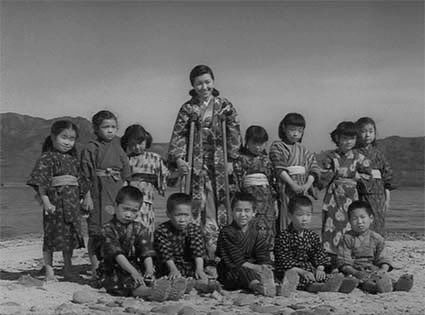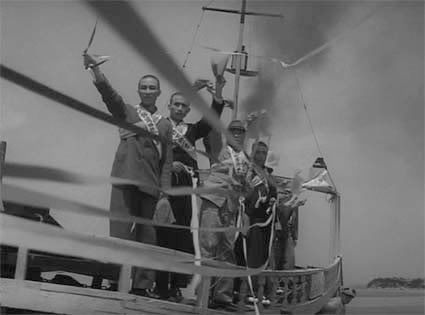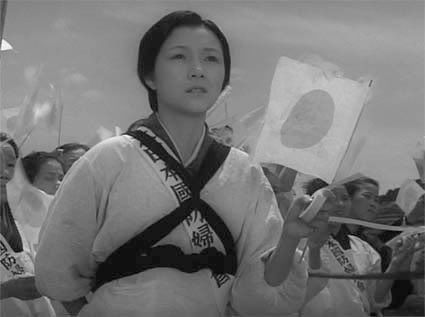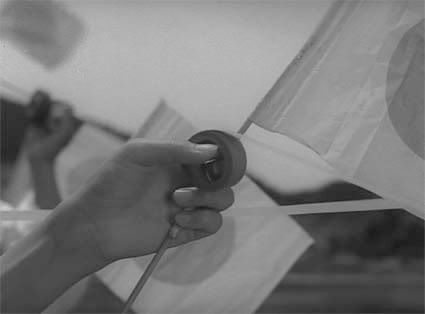
Nijushi no hitomi (Twenty-four eyes, 1954)
Based on a novel by Sakae Tsuboi
Director: Keisuke Kinoshita.
Actors: Hideko Takamine, Chishu Ryu, Hideki Goko, Yukio Watanabe, Eisei Amamoto,...
Full credits at imdb.com
An original Shochiku production. I am commenting on the Spanish DVD release of this film by Notro Films
"How difficult is to deal with women and children... they're crying, crying all the time!"
One of the good things of watching a film at home is that, whenever you're watching a good melodrama, you don't shy away from crying openly. And this film is perfect for that. I picked it because a) I love classic Japanese films and b) it's got Hideko Takamine in the lead... If you are already aware of her, I don't need to elaborate further, if you aren't... well, just make yourself acquainted with her work: honest, you won't regret it.
This film won a good deal of awards, in fact, it won the Kinema Jumpo Award as best film of 1955 over no other than Kurosawa's "Seven Samurai", so you get the idea of how successful it was upon its release. The films about teachers are not considered a genre per se, though that subject has given some very memorable movies about learning and growing up, and this film is a fine example. Keisuke Kinoshita deftly directs the film in a beautiful, lyrical way, if inevitably melancholic in its vision of Japan's recent past.
1928. In a little Japanese island, the first year students at school are about to meet their new teacher, the spirited Oichi-san, quickly dubbed by the naughty kids as Koichi-san ("Miss Pebble", a pun, since Oichi means "Big Stone"). Hisako Oichi soon wins her student's hearts with her open smile and her lively manner. Parents, though are not enthusiastic about that young woman who dresses with western clothes and rides a bicycle: too modern a girl for their tiny rural island. But Hisako ultimately earns the respect of the genitors and her older colleagues (who didn't welcome her new methods). Due to an accident, Hisako has to leave for other school, bidding temporary goodbye to her twelve children, who shall meet her again in the sixth year.

When Hisako meets again her students as teenagers, they look towards the future with dreamy eyes, though reality will start soon to show her ugly face. There's a filmic turning point, as the ship in which Hisako and her class are doing a school-trip crosses with the ship where "Miss Pebble"s Husband works as a sailor. The ships approach each other as to lovers who are going to embrace, while the music speeds its tempo. As the ships meet and the travellers and crews wave hands, nobody is aware that these happy days are going to vanish soon.
In fact, in the same trip, Hisako meets one of her students who had to look for a job after her mother's death: forced to be an adult before time, she works in as a waitress in a restaurant where her former teacher stops to have some tea. During the trip, the boys talk about their wish to serve the emperor: dreams of glory which are more appealing to them than the simple life of the island. Hisako is concerned: she doesn't regard war as something desirable, and more when she has grown to love these kids as if they were her own children.
"The colour of the sea and the shape of the mountains remained the same. Tomorrow became today"
Hisako finds out that she's been teaching "forbidden" stuff to her students... In fact, she just thought that she was opening their eyes to the world, but she learns from her superiors -who consider her a "red"- that her duty is to produce patriotic and unquestioning subjects to the Empire's militaristic regime. That implies shutting up and burning prohibited books on the stove. Hisako is not keen on teaching her students to become cannon fodder, so she quits her job ( The situation depicted here was somewhat reminiscent of the film This Land is Mine, and also of Miss Oki's plight in Osamu Tezuka's comic Adolf). Hisako will even be misunderstood by her own son, who thinks that a mother who doesn't want him to become a soldier is cowardly and unpatriotic.
Meanwhile, adulthood starts to take her toll as Hisako's students have to face poverty, disease or her dreams of youth being shattered, and then war. Hisako's life is touched by tragedy as well. A group photo of their first year becomes a symbol of the lost paradise.
War is never actually seen, only its effects on the community. When Hisako's boys are drafted, she goes to the harbor to bid them farewell. As she holds a streamer, held in the other extreme by one of her alumni , we get the ominous feeling that an umbilical cord is a bout to be broken.



The war is over, and Hisako returns to teaching. Heartbroken about the fate of the children she brought up to believe in the future, she will nevertheless be comforted by the survivors of her doomed class, who show her that she didn't sow the seeds in vain -well, sort of-.
Some links:
- Freda Freiberg's review at Senses of Cinema
- Slarek's review at DVD Outsider l
- Joan Mellen's essay on the film at Eureka Video
- Online documents about "Twenty-Four eyes" and other films by Kinoshita atCinefiles


5 comments:
Me'n vaig al videoclub!
¡Tampoco te pienses que le pongo verde! Estoy muy contento con su trabajo, y aunque no me gusta como a reseteado a Matt, el trato que le ha dado durante toda la aventura hasta este momento de re-equilibrio me ha parecido más que bueno, en especial los momentazos en la cárcel (y aun siento una leve erección con la escena de Matt diciéndole a Frank Castle "¿Nos vamos?" y dándole en los morracos a Wilson y Bullseye.
En realidad, quizás este estado actual le sirva a Bru para replantear el típico DD que, en el fondo, se repite un poco desde Born Again y que consiste en hundirle en la mierda más absoluta una y otra vez, para que luego se acabe relajando la cosa (que por otra parte, les ha dado un resultado mejor que bueno, tanto a Miller como a Quesada, a Bendis o al propio Bru)
Mi juicio final por Bru todavía está por escrbirse según lo que le ocurra al cuernecitos de ahora en adelante, aunque dadas tus críticas, tengo bastante fe en él
This is a wonderful review and I am sorry it took me a while to find it. You know I share your high opinion of Takamine, so beautiful and so versatile. I am sorrier than ever that I missed this at the Cinematheque.
I also just read your piece on The Blue Veil over at Rooting for Laughton, and it occurs to me that the movies have thematic links. Both need to be on DVD!
Campaspe, Thanks for the kudos!
Though I'm aware that I'm not as good as reviewer as you or Ed Copeland, or indeed, the people whose reviews I'm linking at the end of the post... But I felt like dropping my thoughts on it.
You know, as I was watching the film, "The Blue Veil" came to my mind... yes, there are common themes
BTW, "twenty-four eyes" seems to be available in an english-language DVD release, according to IMDB (it seems a zone 2 -european- release). As for now, "The Blue Veil" seems to be out of the market, (except for bootlegs in ebay) which is sad.
BTW, I just got a book about relevant Japanese women, with a handsome chapter on Hideko (so I'm a bit wiser about her if not as wise as I'd like to ). I intend to post sometime soon here about it (will tell you when I do).
nice... i will check it out (if i can find it!)
Post a Comment